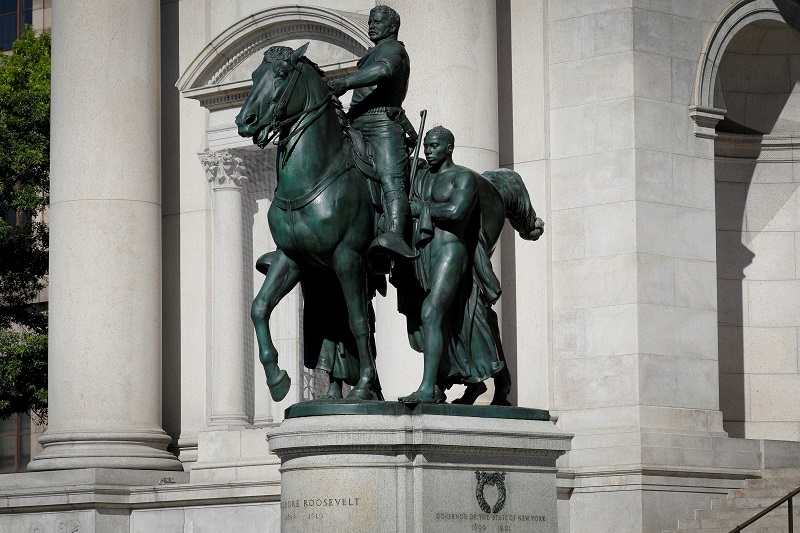
A statue of Theodore Roosevelt outside the American Museum of Natural History in Manhattan is seen after it was announced that the statue will be removed amid anti-racism protests across the United States in New York City, New York, U.S., June 22, 2020.
17:58 JST, August 14, 2022
The United States and Russia are mired in mutual antipathy, and a controversial sentence against a sympathetic defendant forces a confrontation. Russia’s autocratic regime insists the accused is guilty, while the U.S. government demands justice. A treacherous diplomatic dance ensues, complicated by the pressures on a president seeking a public win in a tough campaign season.
The year is 1908. The president is Theodore Roosevelt.
As President Joe Biden engages in a high-stakes game of international brinkmanship to secure the release of Brittney Griner, he might do well to scour the State Department archives for the long-forgotten saga of Jan Janoff Pouren.
Pouren was a peasant from Russian-controlled Latvia who took up arms in 1906 against the czar’s troops during a period of insurrection roiling the Russian Empire. He fled to New York and lived peacefully for two years until the Russians discovered his whereabouts. They requested Pouren’s extradition, alleging that he was a petty criminal who had committed murder, arson and theft.
Pursuant to an extradition treaty, Secretary of State Elihu Root initiated judicial proceedings. Pouren conceded at least some of the charges, but his lawyers argued that his actions were in service of the revolutionary uprising and fell outside the treaty – their client was a political refugee entitled to sanctuary in the United States. Nevertheless, the American extradition commissioner ruled against Pouren. Save for the intervention of the Roosevelt administration, his surrender to Russian authorities was imminent.
Front-page headlines across the country broadcast news of the embattled peasant who would soon be relinquished to the bear’s unforgiving claws. From Montana to Maryland, the press denounced Russia’s attempt to weaponize its extradition treaty in a campaign to suppress revolutionaries.
A reporter mused that the stakes extended well beyond this “mild looking, fair-haired little peasant” to America’s very status as an asylum from tyranny abroad. “When fugitive militants . . . reach our shores and seek refuge in our cities, shall we act as sleuth and police for the tsar and chase down these unfortunates?” he wrote. If the Roosevelt administration agreed to hand over Pouren, countless others who had escaped czarist persecution for the United States might now become vulnerable to extradition.
A mass movement to support Pouren attracted everyone from renowned luminaries to working-class immigrants. As Pouren anxiously awaited his fate in a prison in downtown Manhattan known as “The Tombs,” a lively throng packed into nearby Cooper Union to rally for his cause.
“The great hall was packed in every nook and corner,” recorded the New York Times. One orator galvanized the crowd when he warned that Lady Liberty would be torn down and a Cossack statue erected in her place. A local congressman, who moonlighted as Pouren’s lead attorney, spelled out the far-reaching implications of his client’s fate. “The matter is of tremendous importance,” he told the audience. “It is a test case. If Pouren is extradited there are thousands of men in this country who stand in Pouren’s shoes.” When resolutions calling on Roosevelt to block Pouren’s extradition were read aloud for the crowd’s endorsement, a collective “aye” reverberated throughout the hall.
Pouren had the benefit of auspicious timing. Americans were heading to the polls in November, and the outgoing president was determined to see his war secretary, William Howard Taft, take his place in Pennsylvania Avenue. Roosevelt was not blind to the peril facing both Taft and down-ballot Republicans if he delivered Pouren to the czar. One Republican newspaper cautioned that Pouren’s extradition would “raise such a tempest among the Jews and Russians of New York and Chicago that the Republican Party in November would be crushed beyond recognition.”
As a matter of bureaucratic procedure, the case lay before Secretary Root, and Roosevelt pressured him intensely to reverse the commissioner’s ruling. “My judgment is very strong that we ought to refuse to deliver this man and that we ought to make [an] announcement now,” the president informed Root.
Roosevelt lamented, “We never should have had an extradition treaty with Russia. Its conduct toward so-called political criminals is so inconceivably brutal and foolish.” He derided Russia as congenitally “indifferent to the truth,” adding, “We have no business to treat it as we do the average civilized nation.”
It was late September, and the election was six weeks away. Roosevelt wrote to Root, “I feel that it would be a good thing from every standpoint if we could at once announce that we do not intend to permit the man to be extradited.” It could not have been lost on Root that “every standpoint” meant Taft’s bid for the White House.
In closing his letter, Roosevelt reminded Root of his own supreme authority within the executive branch: “I am informed that under the uniform practice of the Department [of State], the whole matter, as both to law and facts, as to extradition cases of this kind, is vested in the president.” In other words, Roosevelt would resolve the matter to his own satisfaction if Root refused.
Roosevelt wrote to Root again in early October, this time to share new evidence: affidavits from fellow revolutionaries testifying that Pouren’s actions were political – that is, beyond the scope of extraditable offenses. “Unless controverted, these affidavits seem to establish clearly the fact that Pouren was a revolutionist,” the president wrote. Three days later, Roosevelt sent Root a trunk containing a “monster petition” of 80,000 names requesting Pouren’s release.
The secretary of state was inclined toward circumspection in diplomatic affairs, especially when dealing with the unpredictable Russians. He decided to forward the affidavits to the Russian embassy in Washington and invited a response. The Russians sneered, “The embassy does not feel called upon to furnish any proof in addition to that already adduced before the commissioner.” They fulminated against the notion that affidavits could be submitted after the close of an extradition hearing; it was repugnant to “universally accepted principles of law” for Root even to consider this new evidence.
Caught between Roosevelt and Russia, Root found a third way: He voided the ruling against Pouren while giving Russia an opportunity to renew its extradition request. Under those conditions, the United States would retry Pouren’s case instead of setting him free, but this time, the defendant would have the benefit of the affidavits.
Although the whole affair would now extend beyond the election, Root delivered a partial victory to Roosevelt. Taft would go on to win the presidency, partly on the back of the Russian-Jewish vote – and Pouren, ultimately, would gain his freedom.
Now, as the Biden administration weighs a prisoner swap, it finds itself navigating hazardous terrain. Even as many Americans push for Griner’s release, some critics say prisoner swaps give Russia all the wrong incentives to convict more Brittney Griners as future bargaining chips.
In 1908, the U.S. government managed to balance its own countervailing interests that pitted domestic politics against diplomatic caution. Perhaps with the Pouren case as its guide, it can do so again.
Top Articles in News Services
-

Survey Shows False Election Info Perceived as True
-

Prudential Life Expected to Face Inspection over Fraud
-

Hong Kong Ex-Publisher Jimmy Lai’s Sentence Raises International Outcry as China Defends It
-

Japan’s Nikkei Stock Average Touches 58,000 as Yen, Jgbs Rally on Election Fallout (UPDATE 1)
-

Trump Names Former Federal Reserve Governor Warsh as the Next Fed Chair, Replacing Powell
JN ACCESS RANKING
-

Japan PM Takaichi’s Cabinet Resigns en Masse
-

Japan Institute to Use Domestic Commercial Optical Lattice Clock to Set Japan Standard Time
-

Israeli Ambassador to Japan Speaks about Japan’s Role in the Reconstruction of Gaza
-

Man Infected with Measles Reportedly Dined at Restaurant in Tokyo Station
-

Man Infected with Measles May Have Come in Contact with Many People in Tokyo, Went to Store, Restaurant Around When Symptoms Emerged

























